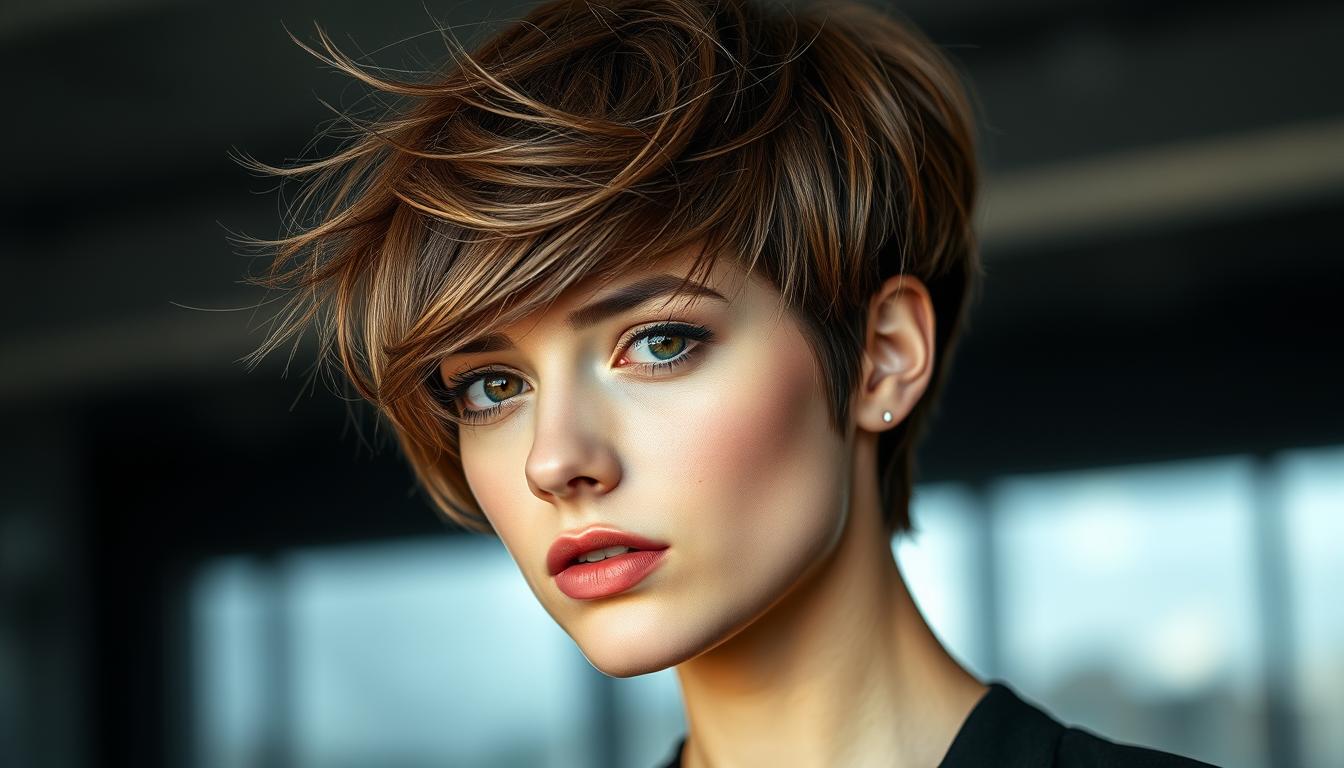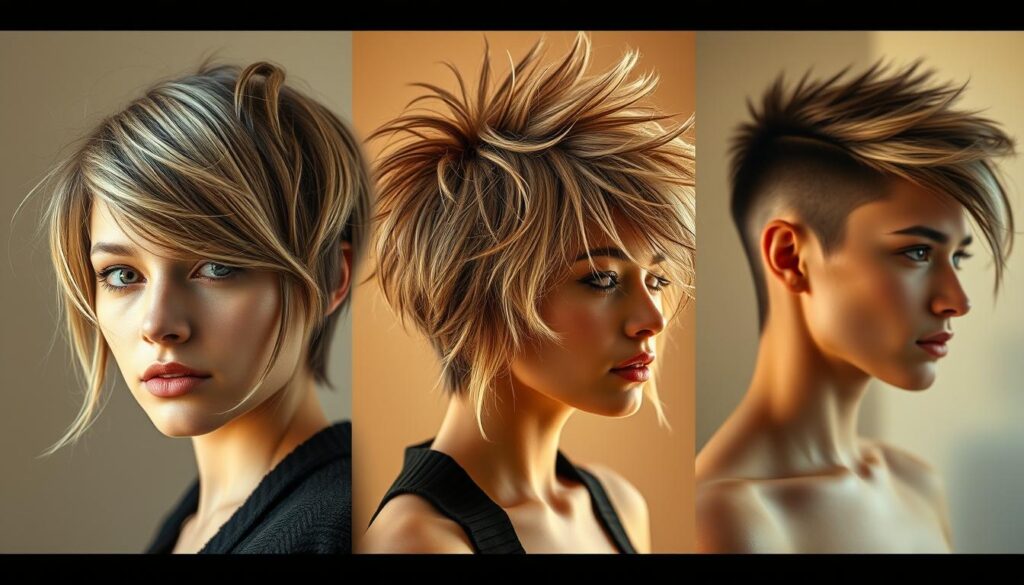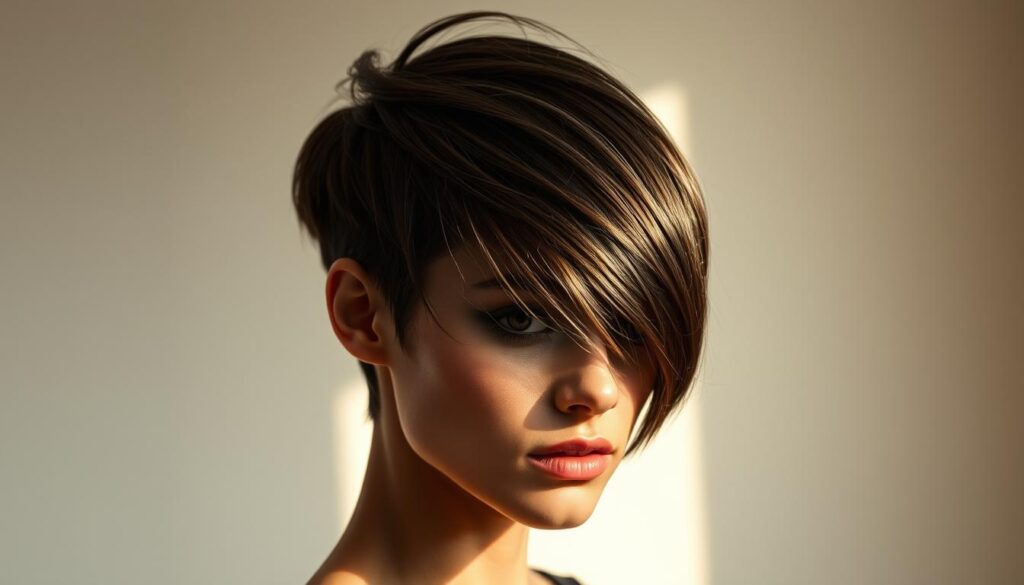
What if your go-to short hairstyle could defy expectations with bold layers and effortless texture? This isn’t just another fleeting trend—it’s a revolution in modern styling that merges retro vibes with contemporary edge. Meet the look that’s dominating salons and social feeds, challenging the idea that cropped lengths can’t deliver drama.
Celebrities and influencers are obsessed with this hybrid design, which blends the carefree spirit of a shag with the tapered shape of a mullet. The magic lies in its strategic layers: shorter pieces at the crown add lift, while longer strands frame the face and neck for movement. Whether your strands are silky or coiled, this shape adapts to highlight natural texture.
Gone are the days when minimal length meant limited options. This style thrives on contrast—think messy volume paired with soft, face-framing angles. It’s a low-maintenance yet statement-making choice, perfect for those craving versatility without sacrificing personality. Ready to unlock its secrets?
Key Takeaways
- Blends retro shag and modern mullet elements for a bold, layered aesthetic
- Creates volume at the crown while maintaining length around the face and neck
- Works with straight, wavy, or curly textures for personalized flair
- Offers effortless styling options that enhance natural movement
- Popularized by celebrities seeking edgy yet wearable everyday looks
Introduction to the Trend
Retro influences meet today’s desire for effortless, statement-making styles. This bold fusion reshapes how we approach texture and volume, blending nostalgia with fresh creativity. The result? A design that feels both rebellious and refined.

From Vintage Roots to Modern Revival
The style’s DNA traces back to the 1970s shag—known for its rockstar energy—and the 1980s mullet’s business-in-front, party-in-back attitude. Modern stylists reimagined these classics by amplifying contrasting layers and softening edges. Think choppy bangs meeting feathered ends, creating movement that dances with every step.
Why Cropped Lengths Shine
Shorter strands elevate the look’s dynamic qualities. With less weight, layers pop naturally, especially around the crown and cheeks. This approach reduces styling time while maximizing impact—a win for busy lifestyles. Want to see how this plays with modern mullet styles? The secret lies in strategic graduation that builds shape without bulk.
Texture becomes the star here. Whether your strands coil tightly or fall straight, the design adapts through customized slicing techniques. It’s not just a trim—it’s a transformation that celebrates individuality while nodding to iconic eras.
wolf cut short hair: Essential Styles and Variations
In the world of hairstyling, few looks blend past and present as seamlessly as this trend. Its chameleon-like adaptability lets wearers channel vintage rockstar energy while embracing today’s love for bold, lived-in texture.

Classic, Layered & Modern Interpretations
The original design relies on feathered ends and crown volume, creating that signature “just-rolled-out-of-bed” charm. Modern twists include micro curtain bangs that soften angular faces and razor-sliced ends for effortless air-dried texture. Bob-length versions with tapered layers offer a polished yet edgy alternative.
Innovative Adaptations from Celebrity Trends
Stars like Billie Eilish have popularized jet-black iterations with cropped sides, while Miley Cyrus’s shaggy mullet hybrid proves this look thrives on rebellion. Stylists now incorporate hidden undercuts or face-framing asymmetry for those craving subtle drama. “It’s about balancing raw edge with wearability,” notes a top LA salon artist.
Whether you prefer messy, piece-y strands or structured graduation, there’s a version that aligns with your lifestyle. The key lies in tailoring the layers to enhance natural movement—no two interpretations look exactly alike.
Styling Techniques and Face Shape Considerations
Your bone structure plays a starring role in maximizing this trend’s potential. The right combination of angles and texture can soften strong jawlines or add dimension to rounder features. Let’s explore how to tailor those choppy layers and fringe details for your unique canvas.
Choosing the Right Bangs and Layers
Curtain bangs work like magic for heart-shaped faces, blending seamlessly into side layers to balance narrower chins. Square jawlines? Try bottleneck fringes—their curved edges soften angular features. For oval faces, micro bangs add playful contrast to longer face-framing pieces.
Layering isn’t one-size-fits-all. Graduated strands near the temples lift flat crowns, while disconnected layers create movement for fine textures. “The goal is to create optical illusions,” explains celebrity stylist Lorna Reeves. “Longer pieces at the cheekbones elongate round faces, while stacked layers add width to slender shapes.”
Customization for Different Face Shapes
Diamond-shaped beauties shine with wispy bangs that taper toward the ears, drawing attention to cheekbones. Those with rectangular faces should opt for side-swept fringe that breaks up vertical length. For triangular features, weightier layers at the jawline counterbalance wider foreheads.
Your stylist might blend razored ends with blunt cuts to suit your hair’s natural flow. Thick textures handle chunky layers beautifully, while finer strands benefit from feathered slicing. Remember: the best looks celebrate your features rather than fighting them.
Tailoring the Look for Different Hair Types
Your strands’ unique personality determines how this edgy style comes to life. By adapting techniques to complement hair texture, you unlock a design that moves with your natural flow rather than fighting it.

Strategies for Straight and Wavy Hair
Straight hair thrives with razored ends and texturizing sprays. Blow-dry roots upward using a round brush, then scrunch mid-lengths with sea salt spray for that lived-in vibe. Flat irons create subtle bends at the crown—perfect for adding dimension.
Wavy hair needs minimal fuss. Let air-dried strands form natural peaks, using light mousse to define bends. Ask your stylist for face-framing layers that start at the cheekbones. This placement highlights your natural texture while keeping volume balanced.
Optimal Techniques for Curly and Fine Hair
Bouncy curls shine when layered sparingly. Focus weight removal at the crown to prevent triangular shapes. A diffuser enhances ringlets without frizz—apply curl cream first for definition.
For fine strands, combine blunt ends with longer layers top. This duo creates fullness without transparency. Try a choppy pixie cut variation with tapered sides for extra lift. Dry shampoo at the roots adds grit for all-day hold.
Mixed textures? Use thinning shears on thicker sections while leaving delicate areas intact. The goal: harmony between your hair types and the style’s rebellious spirit.
Expert Tips and Trending Inspirations
Mastering the perfect balance between bedhead chic and salon precision starts here. Top stylists reveal their go-to methods for keeping this daring look fresh, while social media trends spark new ways to personalize your approach.

Insight from Industry Professionals
Celebrity stylist Jenna Marbles swears by texture spray for razor-cut versions: “Two spritzes at the roots, then scrunch. Instant grit without stiffness.” For curly textures, she recommends finger-coiling damp strands with mousse before air-drying. “This enhances natural patterns while controlling frizz.”
Color specialists emphasize strategic placement. Face-framing money pieces in platinum or caramel make layers pop, while shadow roots maintain depth. “Avoid uniform highlights,” advises colorist Marco Rivera. “Random placement mimics natural sun-kissed movement.”
Practical Advice for Everyday Styling
Mornings become easier with dry shampoo and a wide-tooth comb. Flip your head upside down, spray roots, then gently tease sections for volume. Touch-ups? Smooth flyaways with a dab of pomade on fingertips.
Nighttime prep matters too. Braid damp hair into loose pigtails before bed—wake up with effortless waves. For straight styles, wrap sections around a large curling wand, leaving ends out for that lived-in finish.
Trendsetters are pairing the look with bold accessories. Try metallic clips along layered sections or silk scarves tied at the nape. These details add personality while keeping strands off your face during busy days.
Conclusion
The beauty revolution reshaping modern styling isn’t slowing down. This iconic hairstyle redefines self-expression through its chameleon-like adaptability, proving bold texture and artistic layering work at any length. From sleek bobs to tousled pixie transitions, it celebrates individuality while remaining surprisingly low-fuss.
What makes this trend truly groundbreaking? Its democratic approach. Whether your strands coil tightly or fall pin-straight, strategic graduation creates movement that flatters every face shape. The real magic lies in its evolving nature—stylists continue developing fresh variations with curtain fringes, hidden undercuts, and color-blocked dimensions.
For those ready to transform their look, collaboration matters. Seasoned professionals balance technical precision with creative vision, ensuring your customization enhances natural features. The result? A confidence boost that lasts between salon visits, paired with styling flexibility for busy lifestyles.
As we’ve seen, this isn’t just another passing fad. It’s a movement empowering wearers to embrace their authentic selves through masterful texture play. Why settle for ordinary when your locks can radiate personality with every wind-blown twist?
